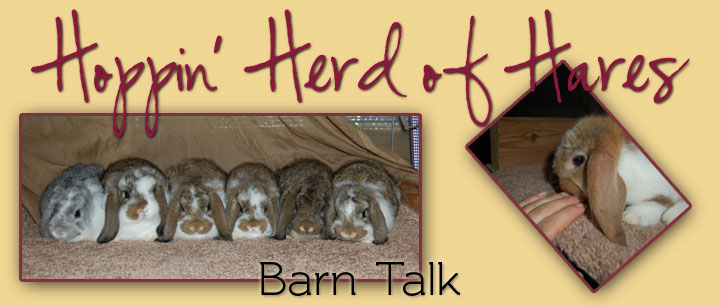This is the second part of a post I did a couple weeks ago that can be found here.
..:Herd Health & Management Part 2:..
There's a lot that goes into maintaining a healthy herd. When it comes to breeding rabbits, there's even more that goes into that.
The phrase "they breed like rabbits" won't be true if you do not have a healthy herd, adequate nutrition for your does (in particular), etc.
A doe that is too fat will not produce well, if she even gets bred at all. If a doe is fed too much or fed a feed which contains too much fat, the fat will build up around her ovaries and make her not able to produce. Once you get a fat doe, it can be difficult to get their weight back down. But, it can be done. Reduced feed, less or no treats and more hay will help bring the doe's weight down.
I hear complaints from breeders quite frequently that their does won't breed. Some of these breeders are newer to rabbits and may not necessarily be doing everything perfect, so that adds to the problems, I'm sure. Or, being new, they may just not think of something that an experienced breeder would think of right away.
Weather can cause does to not be very receptive to the buck. Lack of lighting, cold weather and drastic temperature changes can throw the does receptiveness way off too.
A doe who is thin and not getting enough nutrition may also not be willing to breed. And it wouldn't be wise to breed a doe who is not getting enough nutrition either. That's just asking for problems and puts too much stress on your doe.
Strange noises, new environments or stress can also make it so that a doe does not want to breed.
Bucks don't seem to be as hard to get into the "willing to breed" mood, but there can be hard-heads there too! Or bucks who are slower to learn :). I've had my fair share of slower bucks. They just take more patience.
Giving treats ~ My rabbits all LOVE treats! I think most rabbits, particular those who are spoiled and used to getting treats, go bonkers over anything extra ;).
Treat should be used in moderation though. If you give too many sunflower seeds it'll add too much fat to the rabbits. Just like with everything, it's is good when used in moderation.
In the winter I typically give my rabbits an 1/8 cup of a mix I use - oats/barley/sunflower seeds - every day. They like it a lot and it gives them something extra! In the summer I only give it a couple times a week.
Hay is very important in a rabbits diet too. My rabbits typically get it a couple times a week, unless it's cold and then I may give it every day.
The other treats I give are any fruit & veggie that is safe and we have on hand, papaya, alfalfa cubes and the mix I mentioned above.
Qadoshyah
The phrase "they breed like rabbits" won't be true if you do not have a healthy herd, adequate nutrition for your does (in particular), etc.
A doe that is too fat will not produce well, if she even gets bred at all. If a doe is fed too much or fed a feed which contains too much fat, the fat will build up around her ovaries and make her not able to produce. Once you get a fat doe, it can be difficult to get their weight back down. But, it can be done. Reduced feed, less or no treats and more hay will help bring the doe's weight down.
I hear complaints from breeders quite frequently that their does won't breed. Some of these breeders are newer to rabbits and may not necessarily be doing everything perfect, so that adds to the problems, I'm sure. Or, being new, they may just not think of something that an experienced breeder would think of right away.
Weather can cause does to not be very receptive to the buck. Lack of lighting, cold weather and drastic temperature changes can throw the does receptiveness way off too.
A doe who is thin and not getting enough nutrition may also not be willing to breed. And it wouldn't be wise to breed a doe who is not getting enough nutrition either. That's just asking for problems and puts too much stress on your doe.
Strange noises, new environments or stress can also make it so that a doe does not want to breed.
Bucks don't seem to be as hard to get into the "willing to breed" mood, but there can be hard-heads there too! Or bucks who are slower to learn :). I've had my fair share of slower bucks. They just take more patience.
Giving treats ~ My rabbits all LOVE treats! I think most rabbits, particular those who are spoiled and used to getting treats, go bonkers over anything extra ;).
Treat should be used in moderation though. If you give too many sunflower seeds it'll add too much fat to the rabbits. Just like with everything, it's is good when used in moderation.
In the winter I typically give my rabbits an 1/8 cup of a mix I use - oats/barley/sunflower seeds - every day. They like it a lot and it gives them something extra! In the summer I only give it a couple times a week.
Hay is very important in a rabbits diet too. My rabbits typically get it a couple times a week, unless it's cold and then I may give it every day.
The other treats I give are any fruit & veggie that is safe and we have on hand, papaya, alfalfa cubes and the mix I mentioned above.
Qadoshyah








